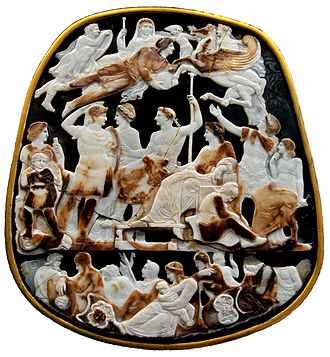Great Cameo of France

The Great Cameo of France (French: Grand Camée de France) is a five-layered sardonyx cameo of circa 23 AD. It is 31 cm by 26.5 cm. It appears to have come to France from the treasury of the Byzantine Empire, and is first attested in the first inventory of the treasure of the Sainte Chapelle before 1279. It was then known as the Triumph of Joseph at the Court of the Pharaoh. It entered the Cabinet des médailles on the order of Louis XVI on 1 May 1791 (inventory number Babelon 264). Stolen during the French Revolution, it was recovered in Amsterdam but without its original gold frame, which was replaced by a bronze one that in turn was lost until 1912.[1] It now resides in Paris at the Bibliothèque Nationale.
Iconography
It is the largest Roman imperial cameo to have survived. It is engraved with twenty-four figures, divided into three levels. The general meaning and iconographic intent of the work are debated, but generally clear and they assert the continuity and dynastic legitimacy of the Julio-Claudian dynasty. In the upper level are its deceased or deified members including Divus Augustus, surrounded by Drusus II, son of Tiberius, and Drusus I ( brother of Tiberius) flying on Pegasus. In the middle level appear the emperor Tiberius flanked by his mother Livia; standing in front of them are Germanicus, Tiberius's designated heir, together with his wife Agrippina the Elder, behind them the future emperor Nero and the figure of Providentia (Foresight); behind Livia and Tiberius are Claudius, emperor when the cameo was made (ca. A.D. 50-54) and his wife Agrippina the Younger. Agrippina the Younger's hairstyle confirms a date for the cameo between her marriage to Claudius in 49 and the accession of her son Nero as the fifth emperor of Rome in 54. The cameo was commissioned to celebrate Claudius's adoption of Nero and the dynastic stability it ensured, comparable to the earlier adoption of Germanicus by Tiberius in A.D. 4, also referenced on the cameo and in the Gemma Augustea. In the lowest level are captive barbarians.
Bibliography
- Babelon, Ernest. Catalogue des Camées antiques et modernes de la Bibliothèque Nationale. Paris : E. Leroux, 1897, n° 264.
- Bibliothèque nationale de France. Trésors de la Bibliothèque nationale de France, I : Mémoires et merveilles. Paris : BNF, 1996, n° 25.
- Giard, Jean-Baptiste. Le grand camée de France, Paris, 1998
- Giuliani, Luca and Gerhard Schmidt, Ein Geschenk für den Kaiser. Das Geheimnis des großen Kameo, Verlag C.H.Beck, Munich 2010.
Jucker, HNA "Der Grosse Pariser Kameo," Jahrbuch des Deutschen Archaologischen Instituts 91 (1976) 211-50.
Exhibitions
| Wikimedia Commons has media related to Great Cameo of France. |
- Exp. 1789, Le Patrimoine libéré : 200 trésors entrés à la Bibliothèque nationale de 1789 à 1799. Paris, Bibliothèque nationale, 1989, n° 83.